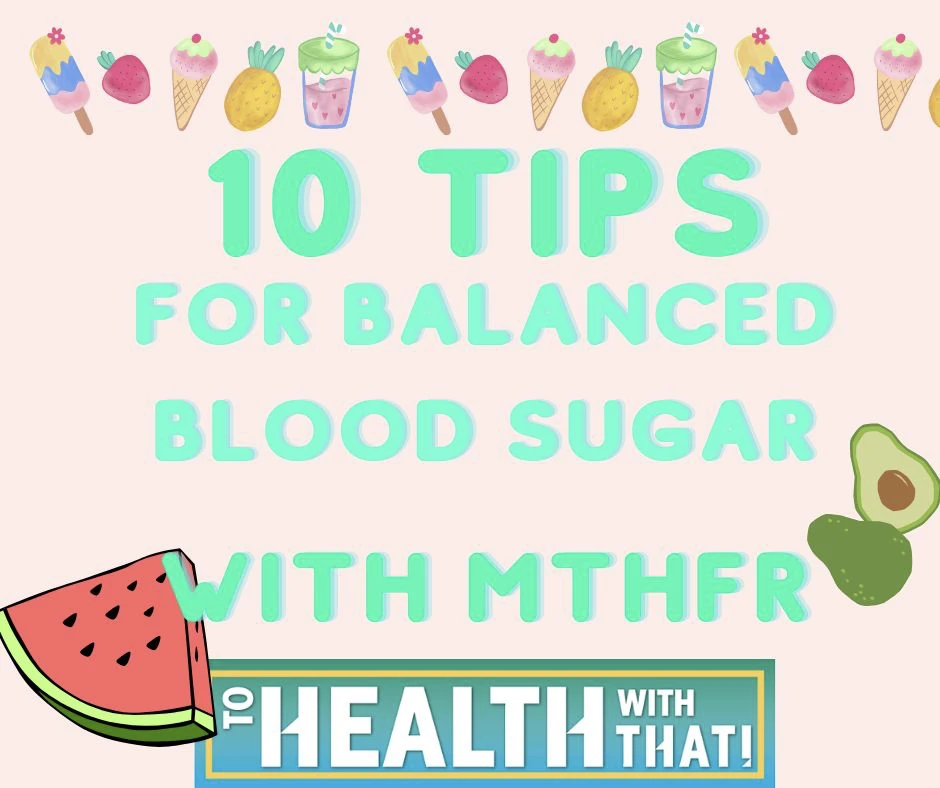Blood sugar matters for everyone because it is linked to or at the root of the top three killers in the US. Balanced blood sugar matters even more for people with the MTHFR mutation because we’re less likely than average to have it. Having an MTHFR genetic mutation means you are more likely to have blood sugar troubles. That could be hypoglycemia, insulin resistance, metabolic syndrome, gestational diabetes, or type 2 diabetes. Even more worrying, is the link between blood sugar and Alzheimer’s dementia, which is a thing nobody wants. So taking steps to help balance your blood sugar can mean more excellent health now and in your years to come.
Low Glycemic Index Foods and Balanced Blood Sugar with MTHFR
Glycemic index measures how quickly and impactfully the foods you eat convert to sugar in your blood. Foods with a higher glycemic index, like table sugar with a GI of 100, convert almost instantly to sugar, causing immediate and drastic spikes in blood sugar. The larger the spike in blood sugar, the quicker the fall in blood sugar, leaving you wallowing around in a grumpy, shaky, headache trench of blood sugar badness.
The more of these drastic ups and downs you have in your day, the more likely your body is going to try to protect itself from all of the drama by both stockpiling your storage form of sugar to release in times of emergency (it’s a quick step from here to serious blood sugar issues) and also to ignore the massive insulin spikes that are released secondary to the blood sugar high. These are the first steps along the pathway to major sugar-related diseases.
Eating foods with low glycemic indexes, like a GI <50, can help keep your blood sugar stable and balanced, prevent symptoms, and, even better, prevent blood sugar-related diseases.
Generally, foods high in fiber, good fats, and protein are likelier to have lower glycemic indexes. Starchy or sugary foods are more likely to have high glycemic indexes and lead to more blood sugar instability. It makes sense. A list of the GI of common foods is here.
The glycemic index is helpful in evaluating the impact of foods on your blood sugar, but it isn’t a complete diet plan in and of itself because it doesn’t include information about vitamins, minerals, and nutrients you need. Still, if you’re working on blood sugar balance, then it’s a helpful tool.

10 Tips for Balanced Blood Sugar with MTHFR from the Glucose Goddess Method
Dr. Jesse Inchauspe is a glucose guru and media darling (not to mention a great researcher). Her book The Glucose Goddess Method outlines ten simple tricks to help balance your blood sugar every day. Dr. Inchauspé wasn’t thinking of people with the MTHFR mutation when she wrote her book, but these practical tips apply to us all. Here they are:
- Eat foods in the right order: fiber first, then proteins and fats, then starches and sugars last (you know, like dessert.)
- Add a veggie starter to one meal a day
- Stop counting calories (yaaaayyy!)
- Have a savory breakfast. Think bacon and eggs instead of cereal or pancakes.
- Eat any type of sugar you like – they’re all the same (not including artificial sweeteners, which are not the same at all).
- Pick dessert after a meal instead of a sweet snack
- Have a tablespoon of vinegar before your highest-sugar meal.
- After you eat, move. Even if it’s just a little.
- Make your snacks savory instead of sweet.
- Put some “clothes” on your carbs, and don’t let those starchy or sweet foods run around naked. This means dressing up your fruits and starches with protein, fat, or fiber to slow down glucose absorption. Like, add a dip to your chips.
How To Know if Your Blood Sugar Is Balanced?
Blood sugar irregularity has its own nasty spectrum of symptoms, including fatigue, especially those sudden energy drops, brain fog, irritability, headaches, weakness, shakiness, and grumpiness. Craving sugar or carb-rich foods can also be a sign that your blood sugar isn’t what it should be. These can be easy symptoms to watch for because they’re all red flags for unstable blood sugars.
In a more medical sense, ask your doctor to test your fasting glucose, which should be between 70 – 100 mg/dl, preferably below 90. Higher than that is creeping into prediabetic territory and lower than that can indicate hypoglycemia. For a longer-range view of your blood sugar, ask your doctor to test your hemoglobin A1c, or HbA1c, which measures the amount of sugar attached to the hemoglobin in your red blood cells. This gives you a good picture of your blood sugar averages for the last six weeks, which should be below 5.7%. HbA1c of 5.7 – 6.4% indicates prediabetes, and 6.5% or more is indicative of type 2 diabetes.
If you are symptom-free and your blood tests are within normal range, you are already doing a wonderful job of balancing your blood sugar. If you notice your blood sugar numbers creeping up or you’re often hitting a wall of fatigue after lunch, it’s time to take a closer look at the foods you’re eating and the simple steps you can take to balance your blood sugar. Also, if your symptoms tend to occur after one particular meal, then it’s a good bet that balancing that particular meal will change the shape of your day and positively impact your blood sugar long term.

Learn more about the perfect diet for an MTHFR variant in the MTHFR Diet course. Optimize your energy, productivity, focus, and mental health by eating the right foods for your genes. Reduce your long-term risk and feel better fast. Learn more and sign up here.
MTHFR is a common genetic mutation that can contribute to anxiety, depression, fatigue, chronic pain, infertility, and more serious conditions like breast implant illness, heart attack, stroke, chronic fatigue syndrome, and some types of cancer. If you know or suspect you have an MTHFR variant, schedule a free 15-minute meet-and-greet appointment with MTHFR expert Dr. Amy today.
Book Your Appointment
